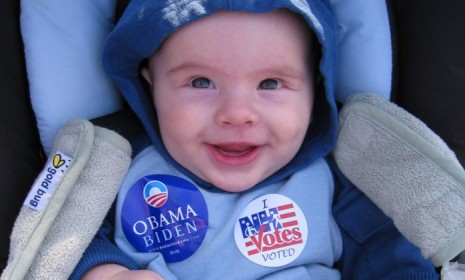The 'liberal gene': An instant guide
Scientists say they have found a gene that pushes some people to the left of the political spectrum. Here's how it works

A free daily email with the biggest news stories of the day – and the best features from TheWeek.com
You are now subscribed
Your newsletter sign-up was successful
Your political views might not be entirely something you pick up at school or in talks around the dinner table — a new study suggests you might have been born with them. Scientists from the University of California-San Diego and Harvard, in a paper published in The Journal of Politics, say they have discovered that some people have a genetic predisposition to liberal thinking. What is this "liberal gene" they found, and does it really decide where a person will end up on the political spectrum? (Watch a discussion about the study)
What did the study find, exactly?
That people born with a variant of the DRDR gene might be more likely to grow up be liberals. UC-San Diego geneticist and political scientist James Fowler and his research team analyzed 2,574 participants in the National Longitudinal Study of Adolescent Health, looking at their genes, number of friends, and political views as adults. They found that people who had both the 7R variant of the gene and a large number of friends in high school were significantly more likely to embrace liberal views.
The Week
Escape your echo chamber. Get the facts behind the news, plus analysis from multiple perspectives.

Sign up for The Week's Free Newsletters
From our morning news briefing to a weekly Good News Newsletter, get the best of The Week delivered directly to your inbox.
From our morning news briefing to a weekly Good News Newsletter, get the best of The Week delivered directly to your inbox.
How does the gene affect how we think?
It helps determine how the brain processes dopamine, a neurotransmitter that affects everything from movement to emotions to how we perceive pleasure and pain. The 7R variant the scientists studied had previously been linked to seeking out new experiences. "In other words," says Catherine Mayer in Time, "people with the DRD4-7R gene are more likely to be game for a laugh, for a dare, for anything new and stimulating" enough to alter dopamine levels and affect their mood.
What does that have to do with politics?
The researchers hypothesize that people more open to new ideas and more unconventional points of views already tend toward liberalism, and if they are exposed to enough different ways of living and viewing the world, their political beliefs will tend to solidify to the left of center. The authors say their study backs that up. Regardless of age, gender, ethnicity, or cultural background, if a subject had the DRD4-7R gene and an active social life as a teenager, he or she was likely to be liberal.
A free daily email with the biggest news stories of the day – and the best features from TheWeek.com
How many friends does it take to nudge you to the left?
Ten. Someone with that many people in his or her close social network — and with two copies of DRD4-7R gene — can move "almost halfway from being conservative to moderate, or from being moderate to liberal." For people without the gene, there was no link between the number of friends and ideology.
Is there a "conservative gene," too?
Presumably. An earlier study of twins suggests that genetics account for about 30 to 40 percent of a person's ideology, and environment another 50 percent. And, the study notes, "psychologists have asserted for many years that social conservatism is heritable." Fowler says it is likely that political ideology has been passed down genetically for tens of millions of years, as being conservative was beneficial in some periods and being liberal helped in others. "If it made sense for us all to be liberal," he says, "natural selection would have made us all liberal."
Sources: Time, Fox News, Washington Post, Daily Telegraph, Discovery, AOL News
-
 Democrats push for ICE accountability
Democrats push for ICE accountabilityFeature U.S. citizens shot and violently detained by immigration agents testify at Capitol Hill hearing
-
 The price of sporting glory
The price of sporting gloryFeature The Milan-Cortina Winter Olympics kicked off this week. Will Italy regret playing host?
-
 Fulton County: A dress rehearsal for election theft?
Fulton County: A dress rehearsal for election theft?Feature Director of National Intelligence Tulsi Gabbard is Trump's de facto ‘voter fraud’ czar